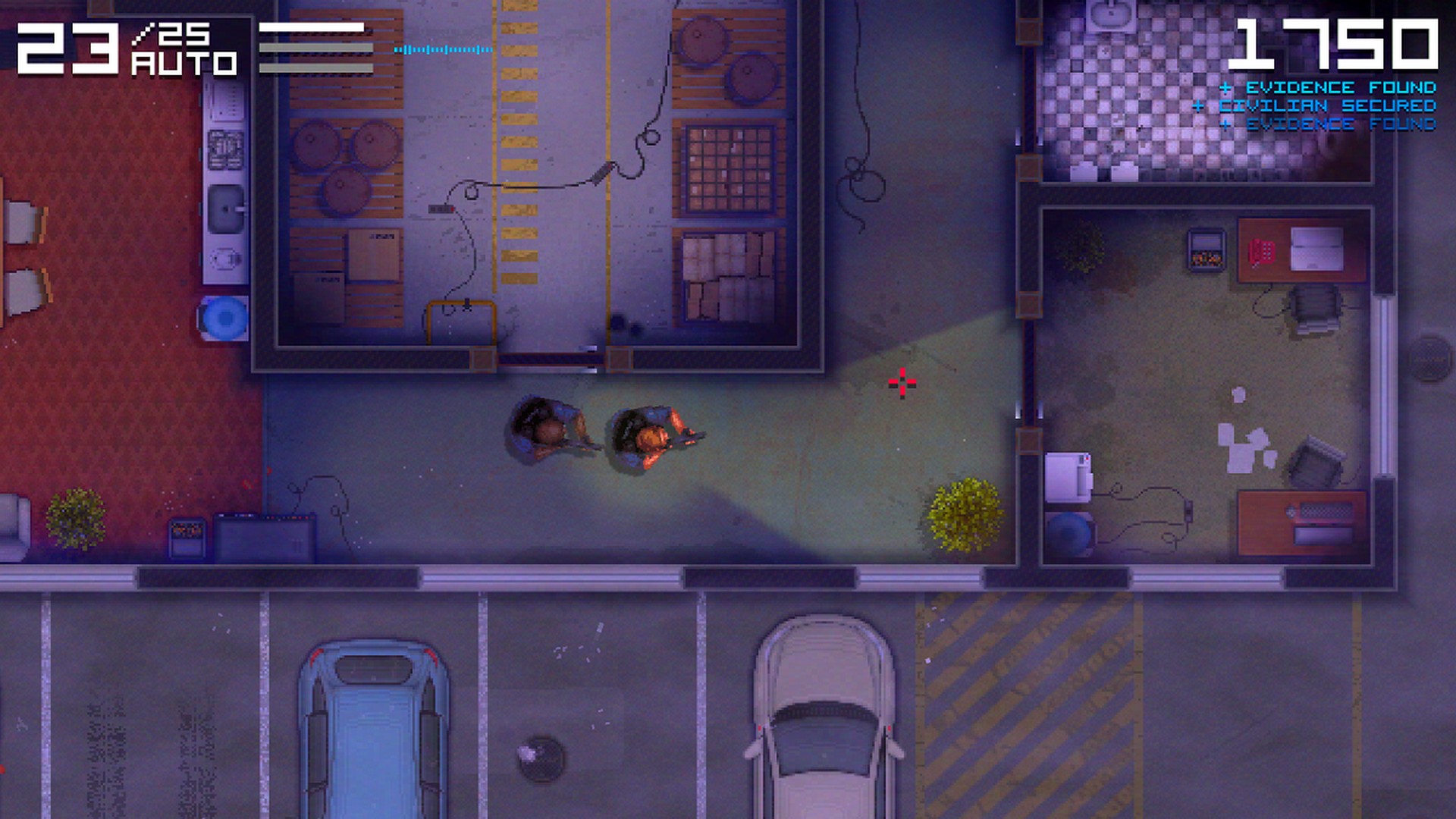Police Stories Review
Hands where I can see ’em!

Have you ever played Hotline Miami and thought to yourself, “this sure is fun but what this party really needs is the law”? Allow me to introduce you to Police Stories, if you haven’t already met. Set in an eighties rendition of 1998, Police Stories follows officers John and Rick through a tale of conspiracy and intrigue. There are bombs, hostages and a whole host of bad dudes to deal with, but this is no action blockbuster. There are rules to being a cop, mister.
If you know anything of Police Stories already you may be surprised to learn it has any plot at all. I was, as the first I saw of the game appeared to be another one of those tactical top-down shooters. A hardcore simulation of managing a SWAT team type of game. Police Stories has a bit of both, with an overarching plot that weaves together each mission the game takes you on.

Our heroes are old academy buddies who have recently reunited when John is transferred to Rick’s precinct. On their first night as partners, they respond to a series of separate crimes which develop a pattern and lead to a deeper mystery.
The story is a dressing on what is ultimately a mechanically driven game, so let’s break that down. The Hotline Miami comparisons are fair; in essence, your objective in this game and that one are the same. Each level presents you with a location, and your job is to clear it of enemies. The difference here is that you are a cop, and violently murdering everyone in sight just isn’t okay.

Allow me to lay out an example. You and your AI partner (or a second player, should you be so lucky) approach a door. If you have a device called a borescope for looking through the door, all the better. Let’s say you don’t, so you’re going in blind. You open the door, and there is a suspect inside. What do you do?
First thing to do is shout, tell the suspect to drop whatever weapon they may be carrying. The suspect may surrender, so you cuff them and move on. They may stand defiant, or run away. In a lot of cases, they may draw their weapon and point it at you.
You have a split second to react, because if you don’t shoot they will. The best outcomes are always arrests; they provide the least risk and the most points for your score. Not only does the game not want you to kill people, it actively makes that the worst outcome, even when it’s the only option. Again, like Hotline Miami, this game is repetitious. You will be retrying levels over and over until you get it right. Unlike Hotline, this game is slow and methodical. It’s tense and every level is a struggle, but inevitably satisfying when it all goes right.

There are just a couple of things about Police Stories I really don’t like, however. The number one thing is how the game progresses. There is a points system, and you are graded on each level completion. A system as old as time, nothing fundamentally wrong there. What I don’t like is that each level has a point requirement to unlock.
You may complete a level and find you have not earned enough points to start the next. It’s annoying and it flies in the face of what I feel the game is trying to say. Police Stories is at its strongest when you are trying to do the best you can in an unpredictable environment. Having to worry about getting enough points to progress breaks the immersion of being a cop dealing with a messy situation. Forcing the player to replay levels they’ve already finished takes away from the experience even further.

My other grievance is the AI partner. Now, this can obviously be mitigated by another human, but I don’t have one of those right now. While playing solo, the AI partner will follow you as you go. You can give them orders – I often ask mine to open locked doors and through flashbangs. That’s pretty handy, but what is less handy is the seemingly random effectiveness of their gun.
There have been times when the AI has shot enemies I haven’t even seen yet, but more often than not they just stand and watch as I do all the shooting. Later areas introduce armoured enemies who soak up bullets, and you can be certain my buddy is just going to leave that to me. Worse still are the times the AI has stood right in the way and gotten shot in the crossfire. My recommendation of this game goes way up if you’ve got someone to play it with.

Police Stories has the kind of 16-bit evocative graphics we see in many modern indie games. It works fine, and there are some pretty cutscenes to boot. The soundtrack is a bit synth-heavy for a game set in 1998 – probably a holdover from the overall 16-bit aesthetic. There are some interesting little twists in the music, along with blatant nods to a certain other game I’ve mentioned too many times already.
The writing is so laden with clichés it couldn’t be anything but intentional. There’s an attempt at a pastiche of 80s/90s action film here that doesn’t quite go all the way, but isn’t entirely unwelcome. These things add a pleasant dash of flavour to what could otherwise be a very mechanical game.
Overall, Police Stories is a game I give a hearty recommendation, all the heartier should you have a buddy cop to bring along. It strikes that same high-paced, repetitive problem solving note as Hotline Miami but in it’s own way. It’s more methodical, you have to stay on your toes. That can be stressful, but very rewarding when a level is completed and done smoothly.
[Reviewed on PC]
